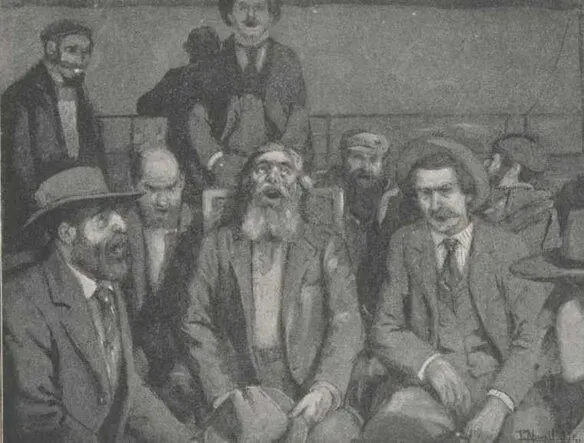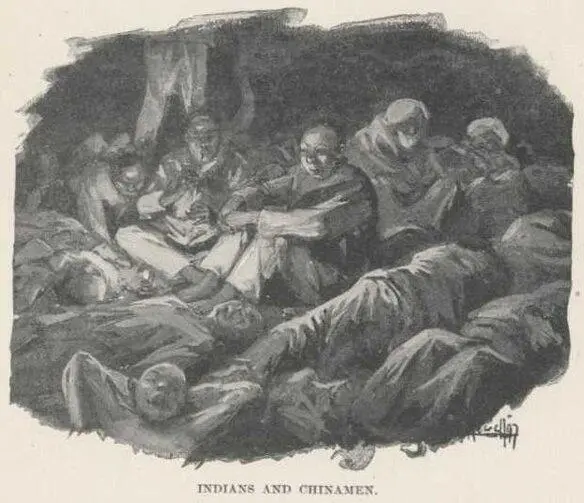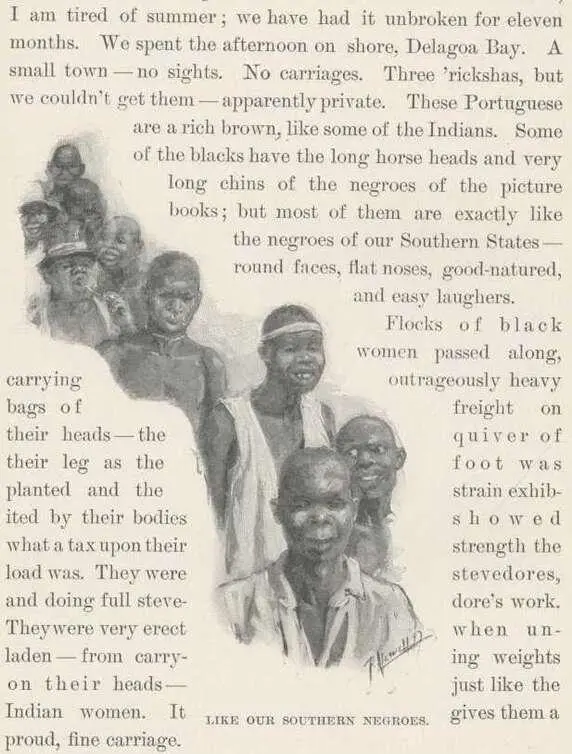Mark Twain - Following the Equator
Здесь есть возможность читать онлайн «Mark Twain - Following the Equator» весь текст электронной книги совершенно бесплатно (целиком полную версию без сокращений). В некоторых случаях можно слушать аудио, скачать через торрент в формате fb2 и присутствует краткое содержание. Год выпуска: 2004, Жанр: Классическая проза, Юмористическая проза, на английском языке. Описание произведения, (предисловие) а так же отзывы посетителей доступны на портале библиотеки ЛибКат.
- Название:Following the Equator
- Автор:
- Жанр:
- Год:2004
- ISBN:нет данных
- Рейтинг книги:3 / 5. Голосов: 1
-
Избранное:Добавить в избранное
- Отзывы:
-
Ваша оценка:
- 60
- 1
- 2
- 3
- 4
- 5
Following the Equator: краткое содержание, описание и аннотация
Предлагаем к чтению аннотацию, описание, краткое содержание или предисловие (зависит от того, что написал сам автор книги «Following the Equator»). Если вы не нашли необходимую информацию о книге — напишите в комментариях, мы постараемся отыскать её.
Following the Equator — читать онлайн бесплатно полную книгу (весь текст) целиком
Ниже представлен текст книги, разбитый по страницам. Система сохранения места последней прочитанной страницы, позволяет с удобством читать онлайн бесплатно книгу «Following the Equator», без необходимости каждый раз заново искать на чём Вы остановились. Поставьте закладку, и сможете в любой момент перейти на страницу, на которой закончили чтение.
Интервал:
Закладка:
All that I remember about Madagascar is that Thackeray's little Billie went up to the top of the mast and there knelt him upon his knee, saying, "I see
"Jerusalem and Madagascar,
And North and South Amerikee."
May 3. Sunday. Fifteen or twenty Africanders who will end their voyage to-day and strike for their several homes from Delagoa Bay to-morrow, sat up singing on the afterdeck in the moonlight till 3 A.M. Good fun and wholesome. And the songs were clean songs, and some of them were hallowed by tender associations.

Finally, in a pause, a man asked, "Have you heard about the fellow that kept a diary crossing the Atlantic?" It was a discord, a wet blanket. The men were not in the mood for humorous dirt. The songs had carried them to their homes, and in spirit they sat by those far hearthstones, and saw faces and heard voices other than those that were about them. And so this disposition to drag in an old indecent anecdote got no welcome; nobody answered. The poor man hadn't wit enough to see that he had blundered, but asked his question again. Again there was no response. It was embarrassing for him. In his confusion he chose the wrong course, did the wrong thing—began the anecdote. Began it in a deep and hostile stillness, where had been such life and stir and warm comradeship before. He delivered himself of the brief details of the diary's first day, and did it with some confidence and a fair degree of eagerness. It fell flat. There was an awkward pause. The two rows of men sat like statues. There was no movement, no sound. He had to go on; there was no other way, at least none that an animal of his calibre could think of. At the close of each day's diary, the same dismal silence followed. When at last he finished his tale and sprung the indelicate surprise which is wont to fetch a crash of laughter, not a ripple of sound resulted. It was as if the tale had been told to dead men. After what seemed a long, long time, somebody sighed, somebody else stirred in his seat; presently, the men dropped into a low murmur of confidential talk, each with his neighbor, and the incident was closed. There were indications that that man was fond of his anecdote; that it was his pet, his standby, his shot that never missed, his reputation-maker. But he will never tell it again. No doubt he will think of it sometimes, for that cannot well be helped; and then he will see a picture, and always the same picture—the double rank of dead men; the vacant deck stretching away in dimming perspective beyond them, the wide desert of smooth sea all abroad; the rim of the moon spying from behind a rag of black cloud; the remote top of the mizzenmast shearing a zigzag path through the fields of stars in the deeps of space; and this soft picture will remind him of the time that he sat in the midst of it and told his poor little tale and felt so lonesome when he got through.
Fifty Indians and Chinamen asleep in a big tent in the waist of the ship forward; they lie side by side with no space between; the former wrapped up, head and all, as in the Indian streets, the Chinamen uncovered; the lamp and things for opium smoking in the center.

A passenger said it was ten 2-ton truck loads of dynamite that lately exploded at Johannesburg. Hundreds killed; he doesn't know how many; limbs picked up for miles around. Glass shattered, and roofs swept away or collapsed 200 yards off; fragment of iron flung three and a half miles.
It occurred at 3 p.m.; at 6, ₤65,000 had been subscribed. When this passenger left, ₤35,000 had been voted by city and state governments and ₤100,000 by citizens and business corporations. When news of the disaster was telephoned to the Exchange ₤35,000 were subscribed in the first five minutes. Subscribing was still going on when he left; the papers had ceased the names, only the amounts—too many names; not enough room. ₤100,000 subscribed by companies and citizens; if this is true, it must be what they call in Australia "a record"—the biggest instance of a spontaneous outpour for charity in history, considering the size of the population it was drawn from, $8 or $10 for each white resident, babies at the breast included.
Monday, May 4. Steaming slowly in the stupendous Delagoa Bay, its dim arms stretching far away and disappearing on both sides. It could furnish plenty of room for all the ships in the world, but it is shoal. The lead has given us 3 1/2 fathoms several times and we are drawing that, lacking 6 inches.
A bold headland—precipitous wall, 150 feet high, very strong, red color, stretching a mile or so. A man said it was Portuguese blood—battle fought here with the natives last year. I think this doubtful. Pretty cluster of houses on the tableland above the red and rolling stretches of grass and groups of trees, like England.
The Portuguese have the railroad (one passenger train a day) to the border—70 miles—then the Netherlands Company have it. Thousands of tons of freight on the shore—no cover. This is Portuguese allover—indolence, piousness, poverty, impotence.
Crews of small boats and tugs, all jet black woolly heads and very muscular.
Winter. The South African winter is just beginning now, but nobody but an expert can tell it from summer. However, I am tired of summer; we have had it unbroken for eleven months. We spent the afternoon on shore, Delagoa Bay. A small town—no sights. No carriages. Three 'rickshas, but we couldn't get them—apparently private. These Portuguese are a rich brown, like some of the Indians. Some of the blacks have the long horse heads and very long chins of the negroes of the picture books; but most of them are exactly like the negroes of our Southern States round faces, flat noses, good-natured, and easy laughers.
Flocks of black women passed along, carrying outrageously heavy bags of freight on their heads. The quiver of their leg as the foot was planted and the strain exhibited by their bodies showed what a tax upon their strength the load was. They were stevedores and doing full stevedore's work. They were very erect when unladden—from carrying heavy loads on their heads—just like the Indian women. It gives them a proud fine carriage.
Sometimes one saw a woman carrying on her head a laden and top-heavy basket the shape of an inverted pyramid—its top the size of a soup-plate, its base the diameter of a teacup. It required nice balancing—and got it.

No bright colors; yet there were a good many Hindoos.
The Second Class Passenger came over as usual at "lights out" (11) and we lounged along the spacious vague solitudes of the deck and smoked the peaceful pipe and talked. He told me an incident in Mr. Barnum's life which was evidently characteristic of that great showman in several ways:
This was Barnum's purchase of Shakespeare's birthplace, a quarter of a century ago. The Second Class Passenger was in Jamrach's employ at the time and knew Barnum well. He said the thing began in this way. One morning Barnum and Jamrach were in Jamrach's little private snuggery back of the wilderness of caged monkeys and snakes and other commonplaces of Jamrach's stock in trade, refreshing themselves after an arduous stroke of business, Jamrach with something orthodox, Barnum with something heterodox—for Barnum was a teetotaler. The stroke of business was in the elephant line. Jamrach had contracted to deliver to Barnum in New York 18 elephants for $360,000 in time for the next season's opening. Then it occurred to Mr. Barnum that he needed a "card". He suggested Jumbo. Jamrach said he would have to think of something else—Jumbo couldn't be had; the Zoo wouldn't part with that elephant. Barnum said he was willing to pay a fortune for Jumbo if he could get him. Jamrach said it was no use to think about it; that Jumbo was as popular as the Prince of Wales and the Zoo wouldn't dare to sell him; all England would be outraged at the idea; Jumbo was an English institution; he was part of the national glory; one might as well think of buying the Nelson monument. Barnum spoke up with vivacity and said:
Читать дальшеИнтервал:
Закладка:
Похожие книги на «Following the Equator»
Представляем Вашему вниманию похожие книги на «Following the Equator» списком для выбора. Мы отобрали схожую по названию и смыслу литературу в надежде предоставить читателям больше вариантов отыскать новые, интересные, ещё непрочитанные произведения.
Обсуждение, отзывы о книге «Following the Equator» и просто собственные мнения читателей. Оставьте ваши комментарии, напишите, что Вы думаете о произведении, его смысле или главных героях. Укажите что конкретно понравилось, а что нет, и почему Вы так считаете.











